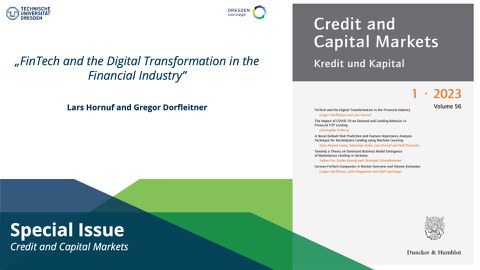Jun 06, 2023
Special Issue in the journal Credit and Capital Markets
Professor Lars Hornuf has been the editor of a special issue in the journal Credit and Capital Markets under the title “FinTech and the Digital Transformation in the Financial Industry.” The special issue emerged in collaboration with Prof. Dr. Gregor Dorfleitner from the University of Regensburg.
For a long time, the financial industry was not at the frontier of digitization. This has changed since the 2010s with the emergence of start-up companies that seek to revolutionize the financial industry: Crowdfunding, robo advice, social trading, the proliferation of cryptocurrencies, and mobile payments services are important examples of new technological solutions mainly brought forward by specialized start-up companies, which are often referred to as FinTechs. The first three articles in the special issue study various aspects of marketplace and peer-to-peer lending. The last article presents a comprehensive overview of the German FinTech market.
In his own article, Lars Hornuf studies marketplace lending in the United States together with Sana Hassan, Dr. Sebastian Huhn, and Prof. Dr. Rolf Drechsler (all three University of Bremen). Considering that internet-based investors may be inexperienced when investing in these new financial products, it appears particularly important to forecast default rates and evaluate the default features of marketplace loans. Given that many borrowers on marketplace lending platforms may already have been rejected by banks or did not even try to obtain a bank loan because they feared rejection, the problem of asymmetric information becomes increasingly relevant. The authors propose a holistic data processing flow for the loan status classification of marketplace-lending multivariate time series data to predict defaulting and distressed loans. The machine learning framework outperforms many conventional techniques, and the approach appears useful for lenders and regulators to identify the most relevant features to enhance their default risk assessment over time.
https://elibrary.duncker-humblot.com/issue/7224/vol-56-2023-issue-1

